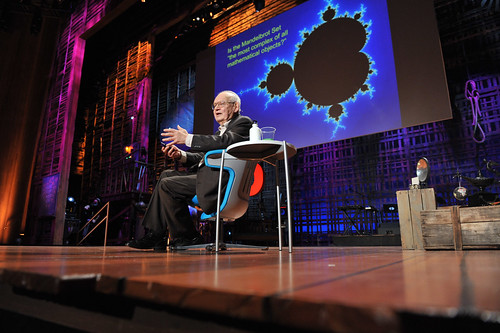Nathalie and I were really glad we had decided to stay to the end. Saturday was a great day.

Benoit Mandelbrot
 Score: 4 balloons
Score: 4 balloonsGeorge Whitesides
 Score: 6 balloons
Score: 6 balloonsThe Harvard chemist, whose publications are the most cited in the field, presented a talk on the two kinds of complexity -- emergent and stacked. Emergent complexity arises out of systems with many simple parts interacting and a steady supply of energy (the most prominent example is human life, which emerged from the evolution of competing cells). Stacked complexity -- like the internet -- emerges from exploiting predictably functional parts in systems with more and more layers of functionality (e.g. transistors, ICs, computers, networks).
This talk should have preceded Mandelbrot's, which might have then made more sense.
This talk should have preceded Mandelbrot's, which might have then made more sense.
Sir Ken Robinson

Score: 10 balloons
 As with Raghava KK's talk, we'd have never guessed beforehand from the speaker's bio or the content that this TED talk would score 10 balloons. But Sir Robinson, whose recent book The Element presents his theories on education, elocuted a summary of those ideas with compelling humor and wit. His primary message is that educators should prioritize the campaign to help students identify and ignite their passions, rather than pushing standard, tedious work.
As with Raghava KK's talk, we'd have never guessed beforehand from the speaker's bio or the content that this TED talk would score 10 balloons. But Sir Robinson, whose recent book The Element presents his theories on education, elocuted a summary of those ideas with compelling humor and wit. His primary message is that educators should prioritize the campaign to help students identify and ignite their passions, rather than pushing standard, tedious work.Philip Howard
 Score: 5 balloons
Score: 5 balloonsPhil Howard, author of Life Without Lawyers, delivered a rousing rally against litigators. It was very well received (way more than my 5 balloons would suggest) but I think it lacked substance and instead merely tapped into mob psychology.
Phil provoked anger at trial lawyers by illustrating examples of trivial litigation. But in my opinion he did not provide a balanced view -- even after cherry picking his examples, I think that they crumbled beneath some critical thought. For example, his flagship example was a schoolteacher he met in the woods one day who complained that she was under legal pressure to reverse her late penalty on a particular student's grade. Furthermore, when she wanted to drive two students to an extracurricular activity, the school prohibited it because of The Lawyers, insisting instead that they use a school bus.
Imagine that! How shocking that parents will sue an earnest, hard-working schoolmum for teaching discipline, and prevent her from simply driving a couple of kids to a scholastic opportunity. Those lawyers are OUT OF CONTROL!!
I don't know the details of the schoolteacher's case -- Howard did not share them. But I do know that in most of these cases where parents seek legal advocates relating to grades, the situation arose because the student -- usually a child on the autism spectrum -- has some learning difference that warrants accommodations in the classroom (such as extra time for homework). These accommodations are exactly the kind that Temple Gardin and Ken Robinson prescribed to standing ovations, not to mention that such accommodations are legally enforceable under federal law. But sadly, teachers who lack experience with learning disabilities sometimes see these accommodations as unfair, coddling, or inconvenient, and choose to ignore them, forcing the parents to either seek legal help or else watch their children unnecessarily fail at school.
As for the school bus, I do not want teachers driving my kids around when a trained, licensed school bus driver is available. Do you?
I am all for legal reform but let's approach it with balance and reason, rather than pitchforks and nooses. Anyway, here's the talk so you can decide for yourself...
Alan Siegel
 Score: 9 balloons
Score: 9 balloonsIf by some chance this TED Member's 3-minute talk makes it into a video, watch it! It was a very compelling description of how this guy makes the world better by simplifying complicated forms. The world is too complex, Alan complains, with too much fine print. But instead of organizing a posse like Philip Howard, Alan does something practical -- he redesigns forms to be much simpler. This kind of transparency is not only good for avoiding legal disputes, but it's also good for business. The examples he showed were a clear, streamlined, one-page credit card agreement that every lender should use, and the second was a streamlined, easy-to-understand IRS form that will replace a gobbledygook 9-page notice that millions of taxpayers get today.
 Adora Svitak
Adora Svitak Score: 8 balloons
Score: 8 balloonsIncredibly impressive 12 year old girl talks about her views on education. The content is secondary -- her charm, confidence, and eloquence are eery.
John Kasaona
 Score: 9 balloons
Score: 9 balloonsFor many decades in John's homeland Namibia, the local "poachers" like John's father were prohibited from the wild game preserves ("This Land For Use Only By White Persons" read the signs) at the punishment of death.
 But the locals had lived alongside the wildlife for millennia, sharing a sustainable ecosystem. Under white rule, the game was hunted for trophy and profit, and the animals dwindled to the point where only 20 lions remained in northwest Namibia. Finally the Prime Minister overruled the colonialists and charged the local poachers with protecting the wildlife. John's father, and later John, were among the newly deputized conservators. According to John, they succeeded in restoring the animal populations, with 60 conservancies now operating across the nation. The program is funded by the newly enabled tourism, with surplus profits funding a thriving new school system. The call to action here was to learn from Namibia's example of how important it is to support the local human populations when trying to conserve ecosystems.
But the locals had lived alongside the wildlife for millennia, sharing a sustainable ecosystem. Under white rule, the game was hunted for trophy and profit, and the animals dwindled to the point where only 20 lions remained in northwest Namibia. Finally the Prime Minister overruled the colonialists and charged the local poachers with protecting the wildlife. John's father, and later John, were among the newly deputized conservators. According to John, they succeeded in restoring the animal populations, with 60 conservancies now operating across the nation. The program is funded by the newly enabled tourism, with surplus profits funding a thriving new school system. The call to action here was to learn from Namibia's example of how important it is to support the local human populations when trying to conserve ecosystems.James Cameron
 Score: 8 balloons
Score: 8 balloonsThe director of blockbuster films like Titanic and Avatar shared some great stories about his life and motivations. James described his younger self as an introverted sci-fi nerd who, for lack of access to space, resolved to learn scuba diving after seeing such alien life forms on the Jacques Cousteau programs. This was the inspiration for The Abyss, the first film to feature a character completely rendered by computer graphics. Cameron also confessed that he agreed to direct Titanic solely because he knew he could thus compel the studio to send him down to tour the real thing, which he did in a Russian submersible. It was on that trip, as he remotely controlled a video robot through the wreckage, that he first became interested in virtual agents and avatars.
Cameron's message was that the most important ingredient for success -- at least in budding filmmakers -- is imagination. And that's what the world needs now.
Cameron's message was that the most important ingredient for success -- at least in budding filmmakers -- is imagination. And that's what the world needs now.
This blog is amazing.. learned a lot even by just scanning the page. Thanks!
ReplyDeleteThe correct shortened form of address when referring to Sir Ken Robinson is "Sir Ken", not "Sir Robinson". His wife, however, would be referred to as "Lady Robinson".
ReplyDelete